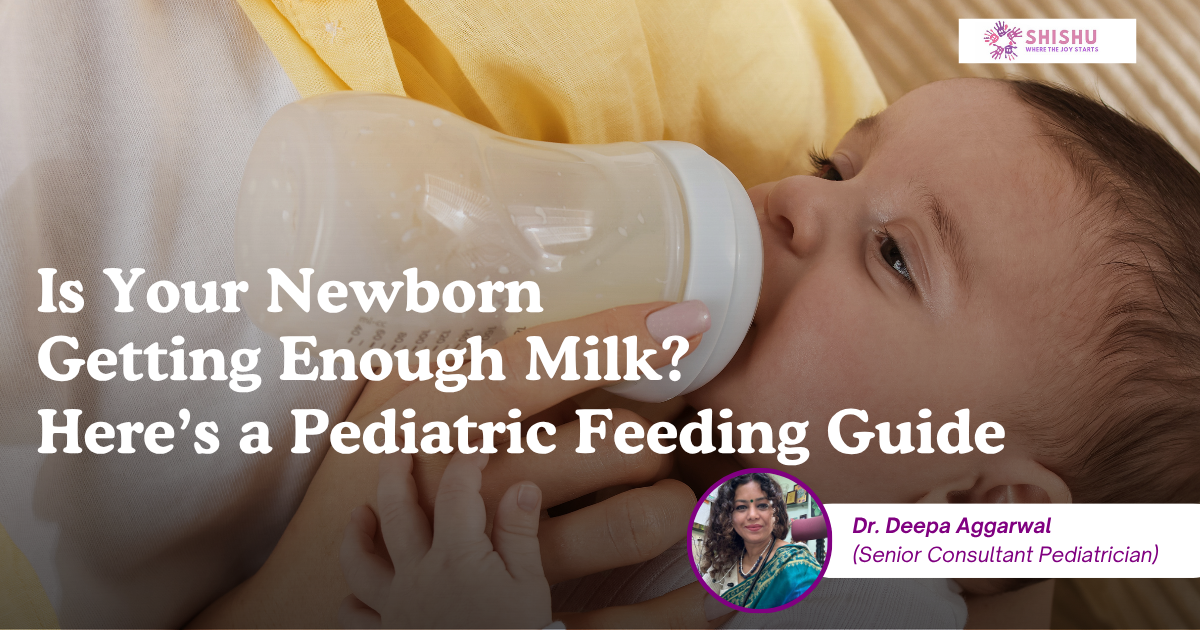
Is Your Newborn Getting Enough Milk? A Pediatrician’s Guide to Formula Feeding & Weight Gain
One of the most common concerns new parents express during newborn check-ups is:
“My baby isn’t gaining weight. Are we feeding enough?”
Understanding newborn feeding requirements in the first month is essential especially when your baby is taking formula milk or a combination of breast milk and formula.
🍼 Why Newborn Feeding Quantity Matters
Newborns grow rapidly in the first few weeks of life. Adequate milk intake supports:
✅ Brain development
✅ Healthy weight gain
✅ Strong immunity
✅ Better digestion & sleep
A newborn’s tummy is tiny and grows week by week:
| Age | Stomach Size | Avg. Feed Per Feed |
|---|---|---|
| Day 1–2 | Size of a cherry 🍒 | 5–10 ml |
| Day 3–4 | Size of a lemon 🍋 | 20–30 ml |
| Day 7–10 | Size of a small orange 🍊 | 40–60 ml |
| 1 Month | Large orange 🍊 | 80–100 ml |
So if a 1-month-old is still only getting 30 ml every 2 hours, that is not enough leading to hunger cues, fussiness, and poor weight gain.
📌 Formula Feeding: How Much Milk is Enough?
After the first 10 days, a newborn needs:
✅ 150 ml per kg per day
Example:
A 3 kg baby needs 450 ml milk per day
= 50–60 ml every 2–3 hours (8–10 feeds per day)
If the baby is still hungry every 30 minutes, it often means the tummy isn’t full enough during feeds.
🌱 Breastfeeding Works on Demand & Supply
Breastfed babies take what they need and the mother’s milk production rises naturally with demand.
But parents using formula must actively measure feeding quantities based on age/weight.
📈 What is Normal Newborn Weight Change?
✔ Newborns lose 5–10% of body weight in the first 7–10 days
✔ By 2 weeks, birth weight returns
✔ After that → steady monthly weight gain is expected
If a baby continues to drop weight after the first 2 weeks schedule an urgent pediatric consult.
🚨 When to See a Doctor Immediately
Seek medical care if your baby:
❌ Isn’t gaining weight week-by-week
❌ Cries for feeds every 20–30 minutes
❌ Has < 6 wet diapers/day
❌ Falls asleep very soon after starting to feed
❌ Shows dehydration signs (dry mouth, sunken eyes, lethargy)
✅ Takeaway for Parents
💡 Knowing how much to feed can prevent weight loss, weakness, dehydration, and unnecessary hospital visits.
Whether breastfeeding, formula feeding, or combination feeding your baby should grow consistently.
When in doubt, consult your pediatrician early.
Early guidance = Healthy growth ✅
